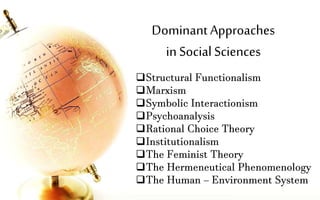DISS - Approaches - Structural Functionalism
•Transferir como PPTX, PDF•
1 gostou•1,506 visualizações
The document outlines several dominant approaches in the social sciences, including structural functionalism, Marxism, symbolic interactionism, psychoanalysis, rational choice theory, institutionalism, feminist theory, hermeneutical phenomenology, and the human-environment system. It provides more detailed descriptions of structural functionalism and Marxism. Structural functionalism views society as a complex system with interconnected parts that work together to maintain stability and equilibrium. It analyzes how societal elements function in a manifest or latent manner. Marxism, developed by Karl Marx, focuses on industrialism and conflicts between social classes.
Denunciar
Compartilhar
Denunciar
Compartilhar

Recomendados
Mais conteúdo relacionado
Mais procurados
Mais procurados (20)
Diss lesson-4-introducing-linguistics-and-political-science

Diss lesson-4-introducing-linguistics-and-political-science
Nature-and-functions-of-Social-Sciences-disciplines-with-the-natural-sciences...

Nature-and-functions-of-Social-Sciences-disciplines-with-the-natural-sciences...
Introduction to Understanding Culture Society and Poltics

Introduction to Understanding Culture Society and Poltics
LESSON 2 DISCIPLINE AND IDEAS IN SOCIAL SCIENCE.pptx

LESSON 2 DISCIPLINE AND IDEAS IN SOCIAL SCIENCE.pptx
Nature, Goals and Perspectives in Anthropology,.pptx

Nature, Goals and Perspectives in Anthropology,.pptx
Semelhante a DISS - Approaches - Structural Functionalism
Semelhante a DISS - Approaches - Structural Functionalism (20)
Social dimensions in Education - Structural functionalism

Social dimensions in Education - Structural functionalism
SOCIOLOGICAL THEORY -Read the following guide to the three cen.docx

SOCIOLOGICAL THEORY -Read the following guide to the three cen.docx
3rd lecture- Sociological perspectives and their applications on health 2020

3rd lecture- Sociological perspectives and their applications on health 2020
Mais de RomlaineOlaso1
Mais de RomlaineOlaso1 (14)
ARALING PANLIPUNAN / MGA REHIYUNAL NA DIBISYON NG ASYA

ARALING PANLIPUNAN / MGA REHIYUNAL NA DIBISYON NG ASYA
CPAR - GAMABA / THE NATIONAL LIVING TREASURES FOR CRAFTS

CPAR - GAMABA / THE NATIONAL LIVING TREASURES FOR CRAFTS
CPAR - GAMABA / THE NATIONAL LIVING TREASURES FOR FOLK LITERATURE AND PREFORM...

CPAR - GAMABA / THE NATIONAL LIVING TREASURES FOR FOLK LITERATURE AND PREFORM...
DIASS - The Discipline of Counseling - Definitions, Context and Concepts, Ga...

DIASS - The Discipline of Counseling - Definitions, Context and Concepts, Ga...
CPAR - Characeristics of Art Practices and Integrative Art

CPAR - Characeristics of Art Practices and Integrative Art
DISS - Introduction, Research, Disciplines:History, Political Science, Langua...

DISS - Introduction, Research, Disciplines:History, Political Science, Langua...
Último
APM Welcome, APM North West Network Conference, Synergies Across Sectors

APM Welcome, APM North West Network Conference, Synergies Across SectorsAssociation for Project Management
Mattingly "AI & Prompt Design: The Basics of Prompt Design"

Mattingly "AI & Prompt Design: The Basics of Prompt Design"National Information Standards Organization (NISO)
Último (20)
Web & Social Media Analytics Previous Year Question Paper.pdf

Web & Social Media Analytics Previous Year Question Paper.pdf
APM Welcome, APM North West Network Conference, Synergies Across Sectors

APM Welcome, APM North West Network Conference, Synergies Across Sectors
9548086042 for call girls in Indira Nagar with room service

9548086042 for call girls in Indira Nagar with room service
Mattingly "AI & Prompt Design: The Basics of Prompt Design"

Mattingly "AI & Prompt Design: The Basics of Prompt Design"
Measures of Central Tendency: Mean, Median and Mode

Measures of Central Tendency: Mean, Median and Mode
social pharmacy d-pharm 1st year by Pragati K. Mahajan

social pharmacy d-pharm 1st year by Pragati K. Mahajan
DISS - Approaches - Structural Functionalism
- 1. Dominant Approaches in Social Sciences Structural Functionalism Marxism Symbolic Interactionism Psychoanalysis Rational Choice Theory Institutionalism The Feminist Theory The Hermeneutical Phenomenology The Human – Environment System
- 2. What is a THEORY?
- 3. Dominant Approaches in Social Sciences Structural Functionalism Marxism Symbolic Interactionism Psychoanalysis Rational Choice Theory Institutionalism The Feminist Theory The Hermeneutical Phenomenology The Human – Environment System a perspective which describes the society as a social system that has a social structure of its own, made up of different parts which are interconnected which works together in harmony to achieve balance of social
- 4. Dominant Approaches in Social Sciences Social institutions as pillars of society: The most functional and most important element of human society. Government Economy Education Religion Family Family Structural Functionalism
- 5. Structural Functionalism Dominant Approaches in Social Sciences Structuralism is the term used that believes that it is a “must” the human should be part of a big structure. Humans should be interrelated with other individuals. Structural-Functionalism describes the effects of societal elements. Functional x Dysfunctional
- 6. Structural Functionalism Dominant Approaches in Social Sciences 2 Types of Function
- 7. Structural Functionalism Dominant Approaches in Social Sciences 2 Types of Function MANIFEST LATENT effects that are intended and recognized by norms consequences that are unintended or hidden
- 8. Structural Functionalism Dominant Approaches in Social Sciences Strengths and Weaknesses o There is a general consensus about the values and norms of society by the majority. o It is made up of integrated parts that are tied together. o It tends to seek stability and avoid conflict (which is seen as dysfunctional). o Uses microlevel analysis in examining issues or problems in society. o They do not see anything wrong with inequality in a society based on class gender or race. o It is not open to social change. o Does not look at the cause (root) of social problem.
- 9. Structural Functionalism EQUILIBRIUM A framework for building a theory that sees society as a complex system whose parts work together to promote solidarity and stability. Such parts of the whole system may vary in terms of functions but they are all related to each other They have all one goal and that is to maintain and keep the whole Talcott Parsons
- 10. Structural Functionalism EQUILIBRIUM AGIL model Adaption Goal Attainment Integration Latency
